译林版(2019)选择性必修 第四册Unit 2 Understanding each other Reading 课件(共42张PPT)
文档属性
| 名称 | 译林版(2019)选择性必修 第四册Unit 2 Understanding each other Reading 课件(共42张PPT) | 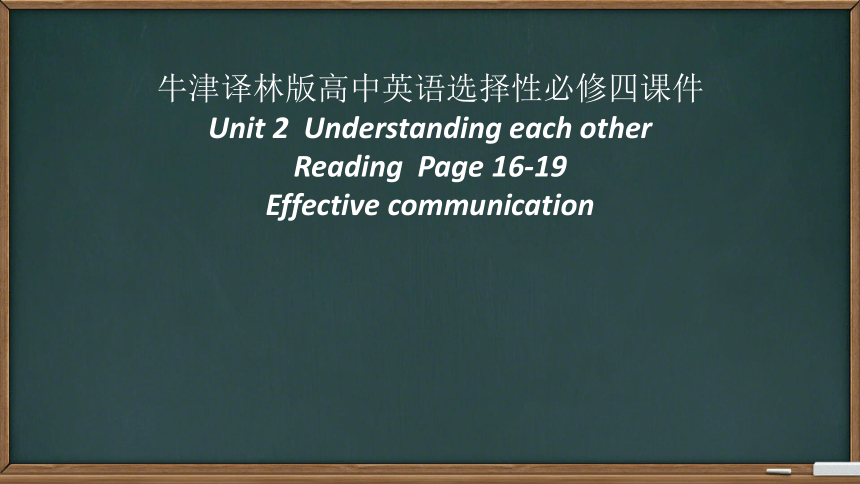 | |
| 格式 | pptx | ||
| 文件大小 | 322.9KB | ||
| 资源类型 | 教案 | ||
| 版本资源 | 牛津译林版(2019) | ||
| 科目 | 英语 | ||
| 更新时间 | 2025-06-21 10:24:46 | ||
图片预览

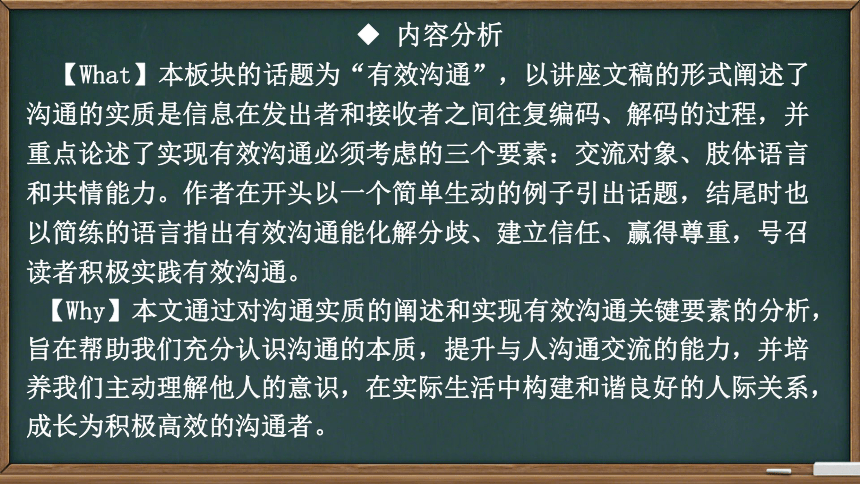
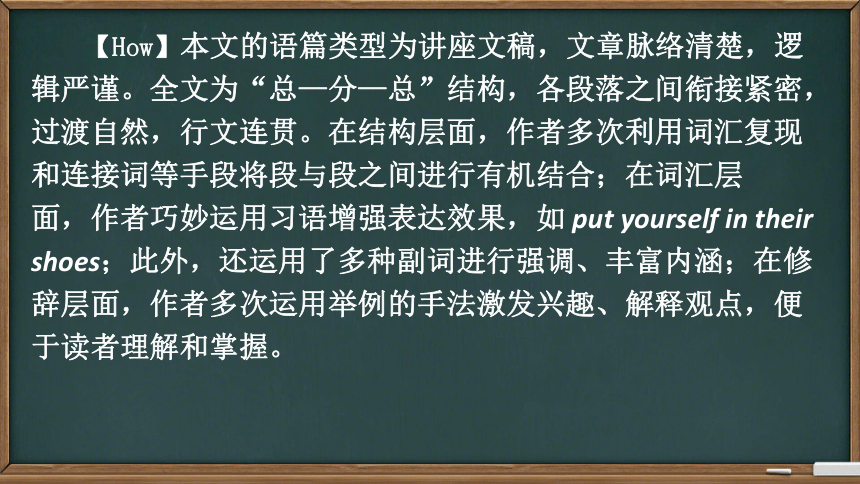
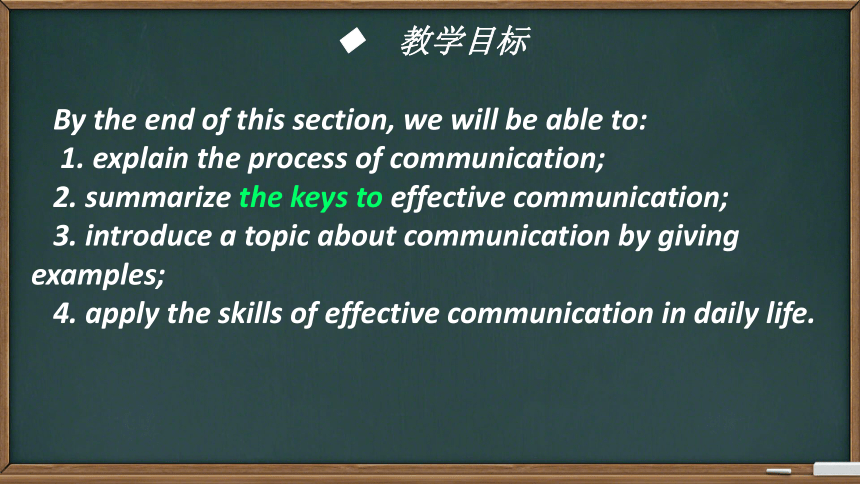
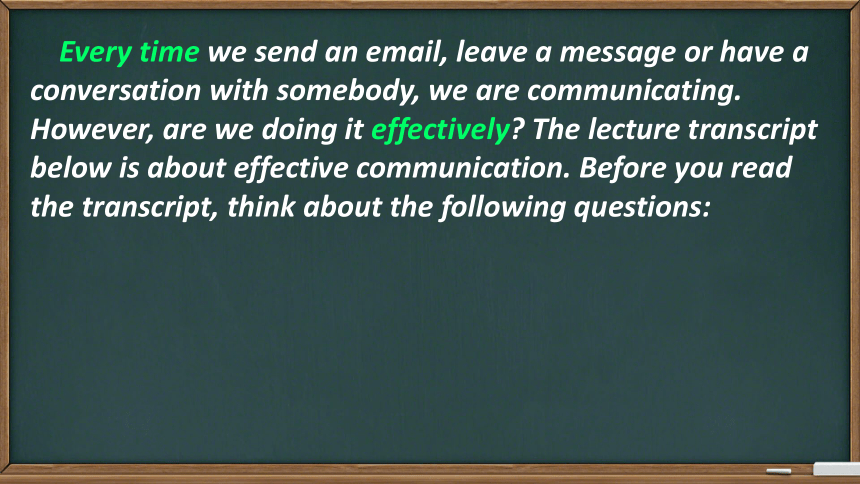
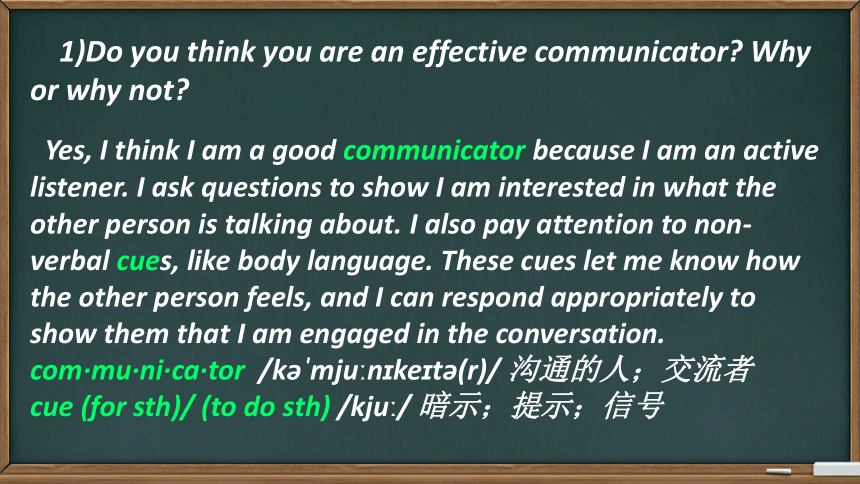
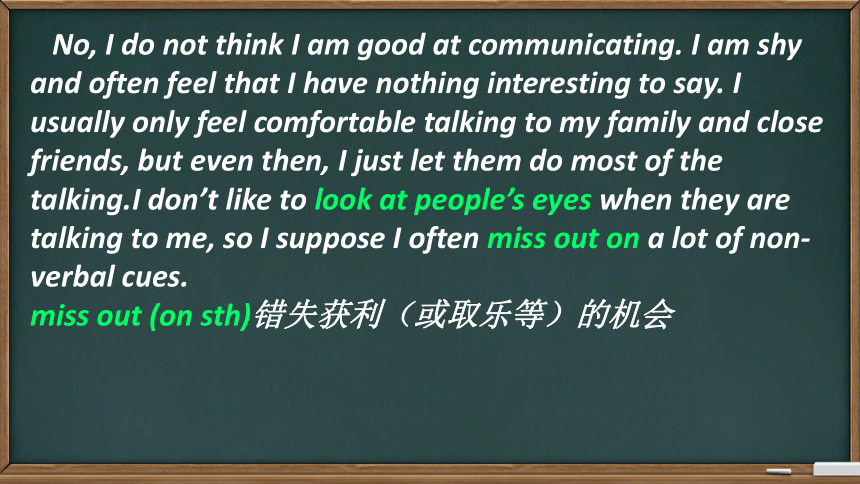
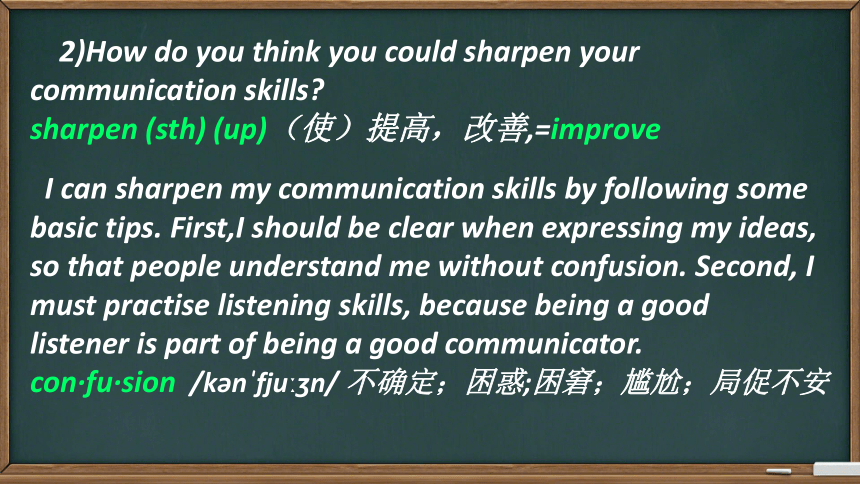
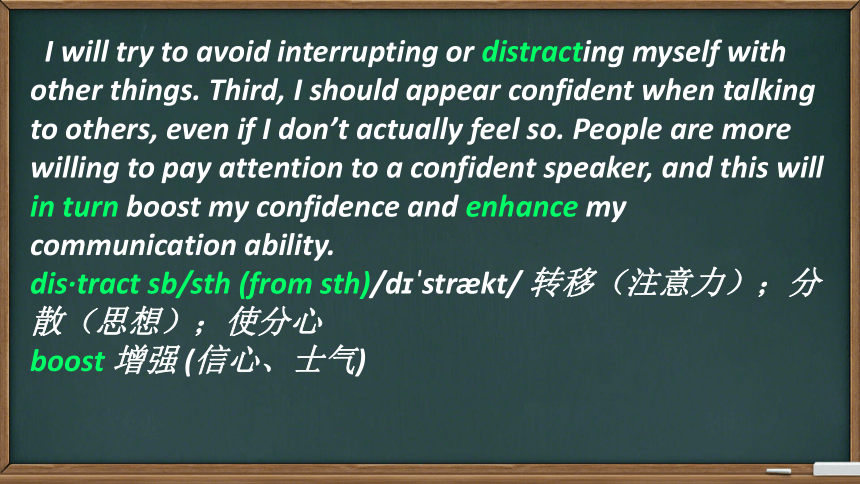
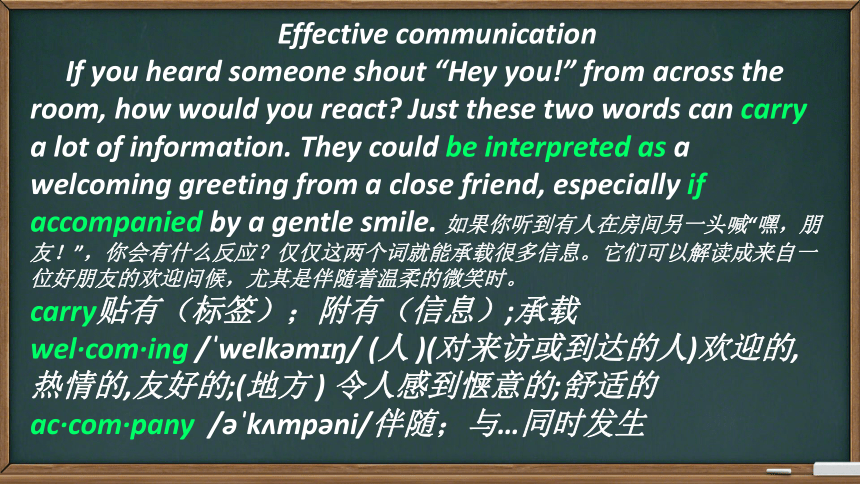
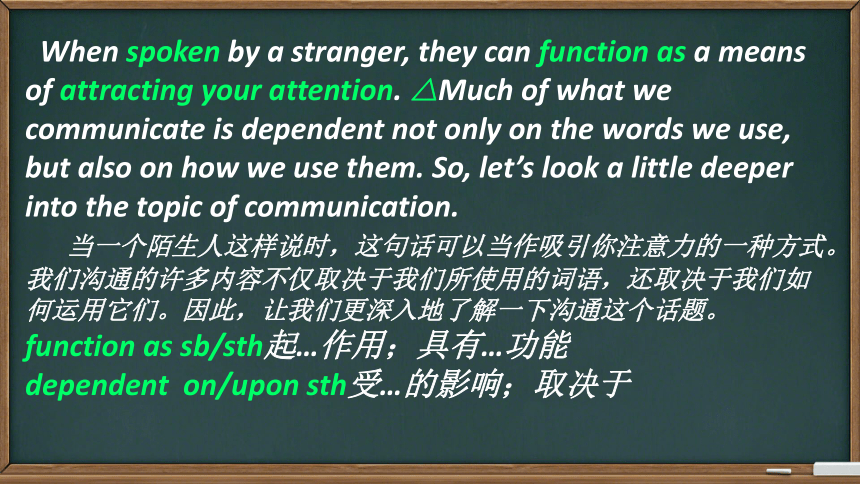
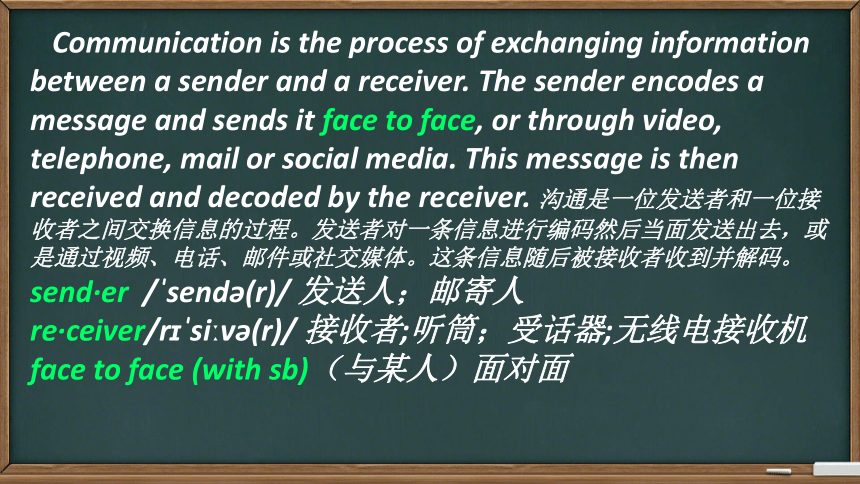
文档简介
(共42张PPT)
牛津译林版高中英语选择性必修四课件
Unit 2 Understanding each other
Reading Page 16-19
Effective communication
◆ 内容分析
【What】本板块的话题为“有效沟通”,以讲座文稿的形式阐述了沟通的实质是信息在发出者和接收者之间往复编码、解码的过程,并重点论述了实现有效沟通必须考虑的三个要素:交流对象、肢体语言和共情能力。作者在开头以一个简单生动的例子引出话题,结尾时也以简练的语言指出有效沟通能化解分歧、建立信任、赢得尊重,号召读者积极实践有效沟通。
【Why】本文通过对沟通实质的阐述和实现有效沟通关键要素的分析,旨在帮助我们充分认识沟通的本质,提升与人沟通交流的能力,并培养我们主动理解他人的意识,在实际生活中构建和谐良好的人际关系,成长为积极高效的沟通者。
【How】本文的语篇类型为讲座文稿,文章脉络清楚,逻辑严谨。全文为“总—分—总”结构,各段落之间衔接紧密,过渡自然,行文连贯。在结构层面,作者多次利用词汇复现和连接词等手段将段与段之间进行有机结合;在词汇层
面,作者巧妙运用习语增强表达效果,如 put yourself in their shoes;此外,还运用了多种副词进行强调、丰富内涵;在修辞层面,作者多次运用举例的手法激发兴趣、解释观点,便于读者理解和掌握。
◆ 教学目标
By the end of this section, we will be able to:
1. explain the process of communication;
2. summarize the keys to effective communication;
3. introduce a topic about communication by giving examples;
4. apply the skills of effective communication in daily life.
Every time we send an email, leave a message or have a conversation with somebody, we are communicating. However, are we doing it effectively The lecture transcript below is about effective communication. Before you read the transcript, think about the following questions:
1)Do you think you are an effective communicator Why or why not
Yes, I think I am a good communicator because I am an active listener. I ask questions to show I am interested in what the other person is talking about. I also pay attention to non-verbal cues, like body language. These cues let me know how the other person feels, and I can respond appropriately to show them that I am engaged in the conversation.
com·mu·ni·ca·tor /k mju n ke t (r)/ 沟通的人;交流者
cue (for sth)/ (to do sth) /kju / 暗示;提示;信号
No, I do not think I am good at communicating. I am shy and often feel that I have nothing interesting to say. I usually only feel comfortable talking to my family and close friends, but even then, I just let them do most of the talking.I don’t like to look at people’s eyes when they are talking to me, so I suppose I often miss out on a lot of non-verbal cues.
miss out (on sth)错失获利(或取乐等)的机会
2)How do you think you could sharpen your communication skills
sharpen (sth) (up)(使)提高,改善,=improve
I can sharpen my communication skills by following some basic tips. First,I should be clear when expressing my ideas, so that people understand me without confusion. Second, I must practise listening skills, because being a good
listener is part of being a good communicator.
con·fu·sion /k n fju n/ 不确定;困惑;困窘;尴尬;局促不安
I will try to avoid interrupting or distracting myself with other things. Third, I should appear confident when talking to others, even if I don’t actually feel so. People are more willing to pay attention to a confident speaker, and this will in turn boost my confidence and enhance my communication ability.
dis·tract sb/sth (from sth)/d str kt/ 转移(注意力);分散(思想);使分心
boost 增强 (信心、士气)
Effective communication
If you heard someone shout “Hey you!” from across the room, how would you react Just these two words can carry a lot of information. They could be interpreted as a welcoming greeting from a close friend, especially if accompanied by a gentle smile. 如果你听到有人在房间另一头喊“嘿,朋友!”,你会有什么反应?仅仅这两个词就能承载很多信息。它们可以解读成来自一位好朋友的欢迎问候,尤其是伴随着温柔的微笑时。
carry贴有(标签);附有(信息);承载
wel·com·ing / welk m / (人 )(对来访或到达的人)欢迎的,热情的,友好的;(地方 ) 令人感到惬意的;舒适的
ac·com·pany / k mp ni/伴随;与…同时发生
When spoken by a stranger, they can function as a means of attracting your attention. △Much of what we communicate is dependent not only on the words we use, but also on how we use them. So, let’s look a little deeper into the topic of communication.
当一个陌生人这样说时,这句话可以当作吸引你注意力的一种方式。我们沟通的许多内容不仅取决于我们所使用的词语,还取决于我们如何运用它们。因此,让我们更深入地了解一下沟通这个话题。
function as sb/sth起…作用;具有…功能
dependent on/upon sth受…的影响;取决于
Communication is the process of exchanging information between a sender and a receiver. The sender encodes a message and sends it face to face, or through video,
telephone, mail or social media. This message is then received and decoded by the receiver. 沟通是一位发送者和一位接收者之间交换信息的过程。发送者对一条信息进行编码然后当面发送出去,或是通过视频、电话、邮件或社交媒体。这条信息随后被接收者收到并解码。
send·er / send (r)/ 发送人;邮寄人
re·ceiver/r si v (r)/ 接收者;听筒;受话器;无线电接收机
face to face (with sb)(与某人)面对面
In response, the receiver sends an encoded message back, which is referred to as feedback. This feedback is decoded by the original sender and the entire cycle repeats itself until they have finished communicating.作为回应,接收者再发回一条编码信息,这就是所谓的反馈。这条反馈再被原先的发送者解码,然后整个过程不断循环往复,直到他们完成沟通。
refer to sth. as ...把...称为...
cycle / sa kl/ 循环;整套,整个系列(如机器的运转);自行车;摩托车
repeat (itself)重复发生;再次发生
This communication process can be challenging but, with practice and patience,you can become a highly competent communicator. To accomplish this, you need to know with whom you are communicating. What is their age or position What is their relationship with you What expectations and cultural backgrounds do they have
com·pe·tent / k mp t nt/ 足以胜任的;有能力的;称职的
com·mu·ni·cate (with sb) /k mju n ke t/ (与某人)交流(信息或消息、意见等);沟通
Once you have obtained this information, you can use it to
determine how best to communicate with them. Depending on whether you are communicating with a stranger, friend, family member or co-worker, you will need to decide which communication channel best suits the situation. 一旦获得了这些信息,你就可以据此决定如何最好地与他们沟通。根据你是否在跟一位陌生人、朋友、家人或者同事在沟通,你将需要决定哪种沟通渠道最适合当下的情况。
depending on :according to视乎;决定于
co-worker 共同工作者;合作者;同事;同僚
Furthermore, you will need to determine the appropriate style to use and how complex your choice of words should be. For example, if you are a business person negotiating with a large enterprise about a deal, you should do it face to face,using formal language in a straightforward manner. 此外,你还要决定使用何种恰当的风格,以及选词应该有多复杂。例如,如果你是一名商务人士,正在与一家大型企业洽谈一笔交易,你应该面对面地、用正式的语言并以直截了当的方式进行沟通。
ne·go·ti·ate (with sb) (for/about sth) /n ɡ ie t/ 谈判;磋商;协商
deal /di l/ 协议;(尤指)交易
Your body language is equally important, since it reveals a lot about your thoughts and attitudes. Make sure it clearly supports the message you want to deliver.△ A smile shows you are attentive to the issues being discussed, while looking away with your arms folded can indicate disinterest and create distrust or friction.微笑表明你对正在讨论的问题很关注,而双臂交叉、看向别处则会表示你不感兴趣,这样会造成不信任或引起摩擦。
at·ten·tive / tent v/ 注意的;专心的;留心的; ~(to sb/sth)关心的;肯帮忙的 away去别处;朝另一个方向
dis·in·ter·est (in sth) /d s ntr st/ 无兴趣;不关心;冷漠
dis·trust (of sb/sth) /d s tr st/ 不信任;怀疑
Additionally, you should not ignore the other person’s body language, which will give you clues as to whether the conversation is going well or not. When you notice a change in the other person’s body language, you should adjust how you are communicating accordingly. 此外,你不应该忽视对方的肢体语言,它会为你提供线索,告诉你谈话进行得顺利与否。当你注意到对方的肢体语言产生变化时,你应该相应地调整你的沟通方式。
clue (to sth) /klu / (帮助警方破案的)线索,迹象;(问题答案的)线索,提示
ac·cord·ing·ly/ k d li/ 照着;相应地;因此;所以
If someone looks at you with a confused expression,this could indicate that they have not completely understood your point. Then you will need to clarify your message before moving on.
△While being knowledgeable about body language is vital, the value of empathy should not be understated.
move on (to sth)开始做(别的事);换话题
know·ledge·able (about sth) / n l d bl/ 博学的;有见识的;知识渊博的,=well informed
under·state / nd ste t/ vt.轻描淡写;避重就轻地说
under·stated / nd ste t d/ 淡雅的;素雅的;柔和的;不过分的
Suppose you are discussing a project with your partner, who has just lost an important basketball game and is inactive. To engage him or her in the discussion and make your communication more effective, you may express your sympathy by,for instance, saying, “I understand how you feel ...” However, some issues may be complicated and you may be confused about why others feel the way they do.
in·active / n kt v/ 无行动的;不活动的;不活跃的;未使用的;不运转的 ;无作用的;无效的
engage sb. in sth.(使)从事,参加
△Only when you give serious consideration to their points of view will you be able to see what accounts for their emotions and empathize with them. You may not approve of their ideas but at least you will see where they are coming from, which means you can make adjustments to your own tone and choice of words accordingly.
只有当你认真考虑他们的想法时才能了解他们为什么有这样的情绪,并与他们产生共鸣。你可能不赞同他们的观点,但至少你会明白这些观点是从何而来,这意味着你可以相应地调整自己的语气和用词。
account for导致; 解释; (数量、比例上) 占; 对…负责;列入预算
em·pa·thize (with sb/sth) / emp θa z/有同感;产生共鸣;表同情
Effective communication will enable you to settle differences and disagreements appropriately and improve your interactions with others. △Good communication skills
will also help you build trust and gain respect, allowing relationships to become more positive and productive. So, get practising and good luck!有效沟通会让你妥善处理不同意见和分歧,改善与他人的互动。良好的沟通技巧也会帮助你建立信任、赢得尊重,让人际关系变得更加积极且富有成效。所以,开始练习吧,祝你好运!
set·tle / setl/ 结束(争论、争端等);解决(分歧、纠纷等)
dif·fer·ence意见分歧;不和
pro·duct·ive /pr d kt v/adj. 有效益的;富有成效的
A. Understanding the text Page 18
A1. Read the lecture transcript and complete the chart below with the main idea of each paragraph.
Para. 2: Messages are encoded by the sender and decoded by the receiver and the cycle is repeated until the communication ends.
Para. 3: You need to know with whom you are communicating and determine what communication channel and style to use.
Para. 4: Your body language should support your message, and you should take note of the other person’s body language so that you know how the conversation is going.
Para. 5: Put yourself in the other person’s shoes and adjust your communication to show you understand their points of view.
A2. Read the lecture transcript again carefully and answer the following questions.
1.What is communication
2.What information can help you determine how best to communicate with others
Communication is the process of exchanging information between a sender and a receiver.
We need to know with whom we are communicating: their age or position, their relationship with you, their expectations and cultural backgrounds.
3.Why should you pay attention to the other person’s body language
4.How can you seek to understand the other person’s emotions
It will give us clues as to whether the conversation is going well or not.
We can seek to understand the other person’s emotions by putting ourselves in their shoes and looking at the situation from their perspective. In complicated cases, we need to give serious consideration to their points of view.
A3. In pairs, discuss the following questions.
1.How can we apply the ideas mentioned in the lecture transcript to cross-cultural communication Give some examples.
It’s important to learn about another person’s cultural background when communicating. You should find out about any communication norms related to age, job and so on, because they may differ from culture to culture. For example,certain cultures often have varying ways of addressing older people, or someone who holds a higher position in an organization.
norms[ pl.]规范;行为标准
address向…说话;称呼(某人)
Body language reveals a lot about you: your culture, thoughts and attitudes. For example, if you use steady eye contact during communication to show that you are
attentive, sometimes the other person may consider it as disrespectful and will feel uncomfortable. For this reason, cues that may cause confusion should be avoided and imitating the other’s body language could prevent any offence. eye contact 目光接触; 对视
disrespectful/ d sr sp ktf l/无礼的
imi·tate/ m te t/ 模仿;仿效
Besides, you should not only be aware of the differences in body language in the other person’s culture, but also ensure that your own body language is not misinterpreted.
The value of empathy should not be understated too. It can bridge the gap because even though we may be different, humans generally express the same emotions.
misinterpret/ m s n t pr t/误解
bridge the gap/divide (between A and B)消除 (甲、乙间的)隔阂/分歧
So, if we are interacting with a foreigner, we will still easily notice if they are, for example, happy or sad. We can then adjust our own body language to show them
how we feel about their emotions. We could smile to share their happiness or gently wrinkle our brows to show concern.
2.What other suggestions can you give on how to become an effective communicator
We can become effective communicators by understanding and respecting other people’s opinions while expressing our own in an open and honest way. Effective communicators focus on expressing their opinions in an appropriate way, rather than winning an argument or forcing their opinions on others.
force sb/sth on/upon sb强迫接受;把…强加给
Another way to become effective communicators is to get more practice. Practice makes perfect.Whether we practise alone or seek out more conversation opportunities, regularly speaking will magnify our communication strengths and weaknesses and allow great communication habits to develop.
seek sb./sth. out 挑选出;物色
mag·nify / m ɡn fa /扩大;增强; 放大;夸大(重要性或严重性);夸张
B. Building your language Page 19
B1. The passage below is about the art of plete the passage with the correct forms of the words and phrases in the box below.
tone feedback obtain approve of
clarify react gentle account for
Active listening is an important skill for good communication. To master it, you can make efforts in two aspects: observing and (1) ________.
reacting
In communication,a message is sent out not only through the speaker’s words and (2) ______,but also through his or her facial expressions and gestures. Keep in mind that body
language plays a huge role in communication because it (3) ____________ over 50 per cent of communication. Looking at the speaker and recognizing his or her facial expressions and gestures allow you to (4) _______ a more accurate understanding of what the speaker is trying to say.
tones
accounts for
obtain
To understand what the speaker communicates, you should do some reflecting or provide (5) _________. The physical signs that you have observed in the speaker should be reflected in your own body. Positive body language can help give the speaker a good impression, for example, a (6) _______ smile, a slight nod and eye contact.You can also repeat what has been said.
com·mu·ni·cate /k mju n ke t/ 传达,传递(想法、感情、思想等)
feedback
gentle
This lets the speaker know that you understand precisely what he or she has said and it allows the speaker to
(7) ______ a point if there is any confusion.More importantly,whether you (8) ___________ the speaker’s words or not, you need to be honest in your response.
When you listen actively, you develop a connection between yourself and the speaker. It thus makes your communication more effective.
pre·cise·ly /pr sa sli/ 准确地;恰好地
clarify
approve of
B2. “Communicate” and “communication” appear in the lecture transcript as part of different collocations. Read the examples below and add more collocations.
col·lo·ca·tion / k l ke n/ 词组;组合;(词语的)搭配,组配
communicate:
communicate + adv.: communicate clearly; communicate directly; communicate verbally; communicate openly
ver·bal·ly / v b li/ adv. 口头上(而非书面或行动上)
open·ly / p nli/ adv. 公开地;毫不隐瞒地
communicate + n.: communicate an idea; communicate a message; communicate an emotion; communicate information
communication:
adj. + communication: effective communication; regular communication; poor communication(沟通不畅); written communication
communication + n.: communication skills; communication problems;communication styles; communication breakdown沟通失败
v. + communication: influence communication; establish communication; maintain communication; enhance communication
B3. The lecturer uses an example to introduce the topic of effective communication. Find the example in the lecture transcript and try to introduce a topic about communication by giving examples.
Learn this: Giving examples is a commonly used technique to introduce a topic in a lecture. It attracts the attention of the audience and allows them to think more actively.
If you heard someone shout “Hey you!” from across the room, how would you react Just these two words can carry a lot of information. They could be interpreted as a
welcoming greeting from a close friend, especially if accompanied by a gentle smile.When spoken by a stranger, they can function as a means of attracting your attention.
Possible answer
If you saw a person standing still in the street and shouting “Fire!” repeatedly without any body gestures or facial expressions, how would you react Compare this person to another person pointing in a certain direction, waving his or her arms wildly, looking very distressed and shouting “Fire!” repeatedly. Which person would you take more seriously in this urgent situation
repeatedly/r pi t dl /反复地; 再三地
wild·ly / wa ldli/ 失控地;紊乱地;极其;非常
dis·tressed /d strest/ 烦恼的;忧虑的;苦恼的;痛苦的;身体虚弱的
牛津译林版高中英语选择性必修四课件
Unit 2 Understanding each other
Reading Page 16-19
Effective communication
◆ 内容分析
【What】本板块的话题为“有效沟通”,以讲座文稿的形式阐述了沟通的实质是信息在发出者和接收者之间往复编码、解码的过程,并重点论述了实现有效沟通必须考虑的三个要素:交流对象、肢体语言和共情能力。作者在开头以一个简单生动的例子引出话题,结尾时也以简练的语言指出有效沟通能化解分歧、建立信任、赢得尊重,号召读者积极实践有效沟通。
【Why】本文通过对沟通实质的阐述和实现有效沟通关键要素的分析,旨在帮助我们充分认识沟通的本质,提升与人沟通交流的能力,并培养我们主动理解他人的意识,在实际生活中构建和谐良好的人际关系,成长为积极高效的沟通者。
【How】本文的语篇类型为讲座文稿,文章脉络清楚,逻辑严谨。全文为“总—分—总”结构,各段落之间衔接紧密,过渡自然,行文连贯。在结构层面,作者多次利用词汇复现和连接词等手段将段与段之间进行有机结合;在词汇层
面,作者巧妙运用习语增强表达效果,如 put yourself in their shoes;此外,还运用了多种副词进行强调、丰富内涵;在修辞层面,作者多次运用举例的手法激发兴趣、解释观点,便于读者理解和掌握。
◆ 教学目标
By the end of this section, we will be able to:
1. explain the process of communication;
2. summarize the keys to effective communication;
3. introduce a topic about communication by giving examples;
4. apply the skills of effective communication in daily life.
Every time we send an email, leave a message or have a conversation with somebody, we are communicating. However, are we doing it effectively The lecture transcript below is about effective communication. Before you read the transcript, think about the following questions:
1)Do you think you are an effective communicator Why or why not
Yes, I think I am a good communicator because I am an active listener. I ask questions to show I am interested in what the other person is talking about. I also pay attention to non-verbal cues, like body language. These cues let me know how the other person feels, and I can respond appropriately to show them that I am engaged in the conversation.
com·mu·ni·ca·tor /k mju n ke t (r)/ 沟通的人;交流者
cue (for sth)/ (to do sth) /kju / 暗示;提示;信号
No, I do not think I am good at communicating. I am shy and often feel that I have nothing interesting to say. I usually only feel comfortable talking to my family and close friends, but even then, I just let them do most of the talking.I don’t like to look at people’s eyes when they are talking to me, so I suppose I often miss out on a lot of non-verbal cues.
miss out (on sth)错失获利(或取乐等)的机会
2)How do you think you could sharpen your communication skills
sharpen (sth) (up)(使)提高,改善,=improve
I can sharpen my communication skills by following some basic tips. First,I should be clear when expressing my ideas, so that people understand me without confusion. Second, I must practise listening skills, because being a good
listener is part of being a good communicator.
con·fu·sion /k n fju n/ 不确定;困惑;困窘;尴尬;局促不安
I will try to avoid interrupting or distracting myself with other things. Third, I should appear confident when talking to others, even if I don’t actually feel so. People are more willing to pay attention to a confident speaker, and this will in turn boost my confidence and enhance my communication ability.
dis·tract sb/sth (from sth)/d str kt/ 转移(注意力);分散(思想);使分心
boost 增强 (信心、士气)
Effective communication
If you heard someone shout “Hey you!” from across the room, how would you react Just these two words can carry a lot of information. They could be interpreted as a welcoming greeting from a close friend, especially if accompanied by a gentle smile. 如果你听到有人在房间另一头喊“嘿,朋友!”,你会有什么反应?仅仅这两个词就能承载很多信息。它们可以解读成来自一位好朋友的欢迎问候,尤其是伴随着温柔的微笑时。
carry贴有(标签);附有(信息);承载
wel·com·ing / welk m / (人 )(对来访或到达的人)欢迎的,热情的,友好的;(地方 ) 令人感到惬意的;舒适的
ac·com·pany / k mp ni/伴随;与…同时发生
When spoken by a stranger, they can function as a means of attracting your attention. △Much of what we communicate is dependent not only on the words we use, but also on how we use them. So, let’s look a little deeper into the topic of communication.
当一个陌生人这样说时,这句话可以当作吸引你注意力的一种方式。我们沟通的许多内容不仅取决于我们所使用的词语,还取决于我们如何运用它们。因此,让我们更深入地了解一下沟通这个话题。
function as sb/sth起…作用;具有…功能
dependent on/upon sth受…的影响;取决于
Communication is the process of exchanging information between a sender and a receiver. The sender encodes a message and sends it face to face, or through video,
telephone, mail or social media. This message is then received and decoded by the receiver. 沟通是一位发送者和一位接收者之间交换信息的过程。发送者对一条信息进行编码然后当面发送出去,或是通过视频、电话、邮件或社交媒体。这条信息随后被接收者收到并解码。
send·er / send (r)/ 发送人;邮寄人
re·ceiver/r si v (r)/ 接收者;听筒;受话器;无线电接收机
face to face (with sb)(与某人)面对面
In response, the receiver sends an encoded message back, which is referred to as feedback. This feedback is decoded by the original sender and the entire cycle repeats itself until they have finished communicating.作为回应,接收者再发回一条编码信息,这就是所谓的反馈。这条反馈再被原先的发送者解码,然后整个过程不断循环往复,直到他们完成沟通。
refer to sth. as ...把...称为...
cycle / sa kl/ 循环;整套,整个系列(如机器的运转);自行车;摩托车
repeat (itself)重复发生;再次发生
This communication process can be challenging but, with practice and patience,you can become a highly competent communicator. To accomplish this, you need to know with whom you are communicating. What is their age or position What is their relationship with you What expectations and cultural backgrounds do they have
com·pe·tent / k mp t nt/ 足以胜任的;有能力的;称职的
com·mu·ni·cate (with sb) /k mju n ke t/ (与某人)交流(信息或消息、意见等);沟通
Once you have obtained this information, you can use it to
determine how best to communicate with them. Depending on whether you are communicating with a stranger, friend, family member or co-worker, you will need to decide which communication channel best suits the situation. 一旦获得了这些信息,你就可以据此决定如何最好地与他们沟通。根据你是否在跟一位陌生人、朋友、家人或者同事在沟通,你将需要决定哪种沟通渠道最适合当下的情况。
depending on :according to视乎;决定于
co-worker 共同工作者;合作者;同事;同僚
Furthermore, you will need to determine the appropriate style to use and how complex your choice of words should be. For example, if you are a business person negotiating with a large enterprise about a deal, you should do it face to face,using formal language in a straightforward manner. 此外,你还要决定使用何种恰当的风格,以及选词应该有多复杂。例如,如果你是一名商务人士,正在与一家大型企业洽谈一笔交易,你应该面对面地、用正式的语言并以直截了当的方式进行沟通。
ne·go·ti·ate (with sb) (for/about sth) /n ɡ ie t/ 谈判;磋商;协商
deal /di l/ 协议;(尤指)交易
Your body language is equally important, since it reveals a lot about your thoughts and attitudes. Make sure it clearly supports the message you want to deliver.△ A smile shows you are attentive to the issues being discussed, while looking away with your arms folded can indicate disinterest and create distrust or friction.微笑表明你对正在讨论的问题很关注,而双臂交叉、看向别处则会表示你不感兴趣,这样会造成不信任或引起摩擦。
at·ten·tive / tent v/ 注意的;专心的;留心的; ~(to sb/sth)关心的;肯帮忙的 away去别处;朝另一个方向
dis·in·ter·est (in sth) /d s ntr st/ 无兴趣;不关心;冷漠
dis·trust (of sb/sth) /d s tr st/ 不信任;怀疑
Additionally, you should not ignore the other person’s body language, which will give you clues as to whether the conversation is going well or not. When you notice a change in the other person’s body language, you should adjust how you are communicating accordingly. 此外,你不应该忽视对方的肢体语言,它会为你提供线索,告诉你谈话进行得顺利与否。当你注意到对方的肢体语言产生变化时,你应该相应地调整你的沟通方式。
clue (to sth) /klu / (帮助警方破案的)线索,迹象;(问题答案的)线索,提示
ac·cord·ing·ly/ k d li/ 照着;相应地;因此;所以
If someone looks at you with a confused expression,this could indicate that they have not completely understood your point. Then you will need to clarify your message before moving on.
△While being knowledgeable about body language is vital, the value of empathy should not be understated.
move on (to sth)开始做(别的事);换话题
know·ledge·able (about sth) / n l d bl/ 博学的;有见识的;知识渊博的,=well informed
under·state / nd ste t/ vt.轻描淡写;避重就轻地说
under·stated / nd ste t d/ 淡雅的;素雅的;柔和的;不过分的
Suppose you are discussing a project with your partner, who has just lost an important basketball game and is inactive. To engage him or her in the discussion and make your communication more effective, you may express your sympathy by,for instance, saying, “I understand how you feel ...” However, some issues may be complicated and you may be confused about why others feel the way they do.
in·active / n kt v/ 无行动的;不活动的;不活跃的;未使用的;不运转的 ;无作用的;无效的
engage sb. in sth.(使)从事,参加
△Only when you give serious consideration to their points of view will you be able to see what accounts for their emotions and empathize with them. You may not approve of their ideas but at least you will see where they are coming from, which means you can make adjustments to your own tone and choice of words accordingly.
只有当你认真考虑他们的想法时才能了解他们为什么有这样的情绪,并与他们产生共鸣。你可能不赞同他们的观点,但至少你会明白这些观点是从何而来,这意味着你可以相应地调整自己的语气和用词。
account for导致; 解释; (数量、比例上) 占; 对…负责;列入预算
em·pa·thize (with sb/sth) / emp θa z/有同感;产生共鸣;表同情
Effective communication will enable you to settle differences and disagreements appropriately and improve your interactions with others. △Good communication skills
will also help you build trust and gain respect, allowing relationships to become more positive and productive. So, get practising and good luck!有效沟通会让你妥善处理不同意见和分歧,改善与他人的互动。良好的沟通技巧也会帮助你建立信任、赢得尊重,让人际关系变得更加积极且富有成效。所以,开始练习吧,祝你好运!
set·tle / setl/ 结束(争论、争端等);解决(分歧、纠纷等)
dif·fer·ence意见分歧;不和
pro·duct·ive /pr d kt v/adj. 有效益的;富有成效的
A. Understanding the text Page 18
A1. Read the lecture transcript and complete the chart below with the main idea of each paragraph.
Para. 2: Messages are encoded by the sender and decoded by the receiver and the cycle is repeated until the communication ends.
Para. 3: You need to know with whom you are communicating and determine what communication channel and style to use.
Para. 4: Your body language should support your message, and you should take note of the other person’s body language so that you know how the conversation is going.
Para. 5: Put yourself in the other person’s shoes and adjust your communication to show you understand their points of view.
A2. Read the lecture transcript again carefully and answer the following questions.
1.What is communication
2.What information can help you determine how best to communicate with others
Communication is the process of exchanging information between a sender and a receiver.
We need to know with whom we are communicating: their age or position, their relationship with you, their expectations and cultural backgrounds.
3.Why should you pay attention to the other person’s body language
4.How can you seek to understand the other person’s emotions
It will give us clues as to whether the conversation is going well or not.
We can seek to understand the other person’s emotions by putting ourselves in their shoes and looking at the situation from their perspective. In complicated cases, we need to give serious consideration to their points of view.
A3. In pairs, discuss the following questions.
1.How can we apply the ideas mentioned in the lecture transcript to cross-cultural communication Give some examples.
It’s important to learn about another person’s cultural background when communicating. You should find out about any communication norms related to age, job and so on, because they may differ from culture to culture. For example,certain cultures often have varying ways of addressing older people, or someone who holds a higher position in an organization.
norms[ pl.]规范;行为标准
address向…说话;称呼(某人)
Body language reveals a lot about you: your culture, thoughts and attitudes. For example, if you use steady eye contact during communication to show that you are
attentive, sometimes the other person may consider it as disrespectful and will feel uncomfortable. For this reason, cues that may cause confusion should be avoided and imitating the other’s body language could prevent any offence. eye contact 目光接触; 对视
disrespectful/ d sr sp ktf l/无礼的
imi·tate/ m te t/ 模仿;仿效
Besides, you should not only be aware of the differences in body language in the other person’s culture, but also ensure that your own body language is not misinterpreted.
The value of empathy should not be understated too. It can bridge the gap because even though we may be different, humans generally express the same emotions.
misinterpret/ m s n t pr t/误解
bridge the gap/divide (between A and B)消除 (甲、乙间的)隔阂/分歧
So, if we are interacting with a foreigner, we will still easily notice if they are, for example, happy or sad. We can then adjust our own body language to show them
how we feel about their emotions. We could smile to share their happiness or gently wrinkle our brows to show concern.
2.What other suggestions can you give on how to become an effective communicator
We can become effective communicators by understanding and respecting other people’s opinions while expressing our own in an open and honest way. Effective communicators focus on expressing their opinions in an appropriate way, rather than winning an argument or forcing their opinions on others.
force sb/sth on/upon sb强迫接受;把…强加给
Another way to become effective communicators is to get more practice. Practice makes perfect.Whether we practise alone or seek out more conversation opportunities, regularly speaking will magnify our communication strengths and weaknesses and allow great communication habits to develop.
seek sb./sth. out 挑选出;物色
mag·nify / m ɡn fa /扩大;增强; 放大;夸大(重要性或严重性);夸张
B. Building your language Page 19
B1. The passage below is about the art of plete the passage with the correct forms of the words and phrases in the box below.
tone feedback obtain approve of
clarify react gentle account for
Active listening is an important skill for good communication. To master it, you can make efforts in two aspects: observing and (1) ________.
reacting
In communication,a message is sent out not only through the speaker’s words and (2) ______,but also through his or her facial expressions and gestures. Keep in mind that body
language plays a huge role in communication because it (3) ____________ over 50 per cent of communication. Looking at the speaker and recognizing his or her facial expressions and gestures allow you to (4) _______ a more accurate understanding of what the speaker is trying to say.
tones
accounts for
obtain
To understand what the speaker communicates, you should do some reflecting or provide (5) _________. The physical signs that you have observed in the speaker should be reflected in your own body. Positive body language can help give the speaker a good impression, for example, a (6) _______ smile, a slight nod and eye contact.You can also repeat what has been said.
com·mu·ni·cate /k mju n ke t/ 传达,传递(想法、感情、思想等)
feedback
gentle
This lets the speaker know that you understand precisely what he or she has said and it allows the speaker to
(7) ______ a point if there is any confusion.More importantly,whether you (8) ___________ the speaker’s words or not, you need to be honest in your response.
When you listen actively, you develop a connection between yourself and the speaker. It thus makes your communication more effective.
pre·cise·ly /pr sa sli/ 准确地;恰好地
clarify
approve of
B2. “Communicate” and “communication” appear in the lecture transcript as part of different collocations. Read the examples below and add more collocations.
col·lo·ca·tion / k l ke n/ 词组;组合;(词语的)搭配,组配
communicate:
communicate + adv.: communicate clearly; communicate directly; communicate verbally; communicate openly
ver·bal·ly / v b li/ adv. 口头上(而非书面或行动上)
open·ly / p nli/ adv. 公开地;毫不隐瞒地
communicate + n.: communicate an idea; communicate a message; communicate an emotion; communicate information
communication:
adj. + communication: effective communication; regular communication; poor communication(沟通不畅); written communication
communication + n.: communication skills; communication problems;communication styles; communication breakdown沟通失败
v. + communication: influence communication; establish communication; maintain communication; enhance communication
B3. The lecturer uses an example to introduce the topic of effective communication. Find the example in the lecture transcript and try to introduce a topic about communication by giving examples.
Learn this: Giving examples is a commonly used technique to introduce a topic in a lecture. It attracts the attention of the audience and allows them to think more actively.
If you heard someone shout “Hey you!” from across the room, how would you react Just these two words can carry a lot of information. They could be interpreted as a
welcoming greeting from a close friend, especially if accompanied by a gentle smile.When spoken by a stranger, they can function as a means of attracting your attention.
Possible answer
If you saw a person standing still in the street and shouting “Fire!” repeatedly without any body gestures or facial expressions, how would you react Compare this person to another person pointing in a certain direction, waving his or her arms wildly, looking very distressed and shouting “Fire!” repeatedly. Which person would you take more seriously in this urgent situation
repeatedly/r pi t dl /反复地; 再三地
wild·ly / wa ldli/ 失控地;紊乱地;极其;非常
dis·tressed /d strest/ 烦恼的;忧虑的;苦恼的;痛苦的;身体虚弱的
同课章节目录
